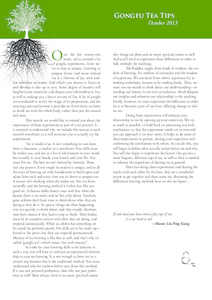
 |
|
Over the last twenty-one issues, we've covered a lot of gongfu experiments, from water to heat to teapots. Learning to prepare better and more refined tea is a lifetime of joy, with endless subtleties to master. And which you choose to focus on and develop is also up to you. Some degree of mastery will heighten your sensitivity and deepen your relationship to Tea, as well as making you a better servant of Tea. A lot of people are introduced to tea by the magic of its preparation, and the amazing tastes and aromas it provides us. Form there, we learn to drink tea with the whole body, rather than just the mouth and nose.
This month, we would like to remind you about the importance of these experiments as part of a tea practice. It is essential to understand why we include this section in each month's newsletter, as it will motivate you to actually try the experiments.
Tea is inside of us. It isn't something we can learn from a classroom, a teacher or a newsletter. Your skills must be within you, and not as a list of information in your mind, but actually in your hands, your breath and your life. You must live tea. The best tea isn't brewed by formula. There isn't any pattern. Every single tea session is unique, and so all the ways of brewing are only foundations to build upon and adapt from each and every time you sit down to prepare tea. A master isn't thinking when she makes tea. Her tea flows naturally, and the brewing method is within her, like any good art. A famous ballet dancer once said that when she dances there is no music and no her, only dance. Similarly, great athletes don't have time to think about what they are doing as they do it. In sports, things are often happening way too quickly to think about, and they would, therefore, miss their chance if they had to stop to think. Their bodies must be in complete unison with what they are doing, and respond automatically. When an athlete has something on his mind, he performs poorly. His skills are in his make-up - honed to the point that they can respond spontaneously. Mastery of tea brewing is like that as well, and that's why it's called "gongfu tea", which means "tea with mastery".
In order for your brewing skills to be inherent in such a way, you will have to cultivate an experiential relationship to your tea brewing. It is not enough to brew tea in a certain way because that is the traditional method. You must understand why the teachers before you chose that method. If it was just personal preference, then why not your preference as well? Most always, there is an outer, practical reason October 2013 why things are done and an inner, spiritual reason as well. And you'll need to experience these differences in order to fully embody the teachings.
The Buddha taught three kinds of wisdom: the wisdom of learning, the wisdom of rationality and the wisdom of experience. We can learn from others' experience by attending workshops, lectures or by reading books. Then, we must use our minds to think about our understanding - rewording our lessons in our own articulation, which deepens our insights and enhances our relationship to the teaching. Finally, however, we must experience the difference in order for it to become a part of our lives, effecting change in who we are.
Doing these experiments will enhance your relationship to tea by opening up your sensitivity. We try, as much as possible, to hold back on presenting you with conclusions, so that the experiment stands on its own and you can approach it on your terms. It helps to do some of these experiments in groups, sharing your experience and confirming the conclusions with others. As you do this, you will begin to define what actually makes better tea and why. You will also begin to experience the factors that go into a more fragrant, delicious cup of tea, as well as what is needed to enhance the experience of sharing tea in general. Have fun doing these experiments and sharing the results with each other. In the least, they are a wonderful excuse to get together and share some tea, discussing the differences brewing methods have on this tea liquor...

If and until you have tried a fine cup of tea, it is too hard to tell.
